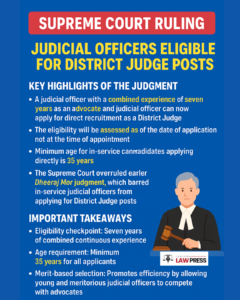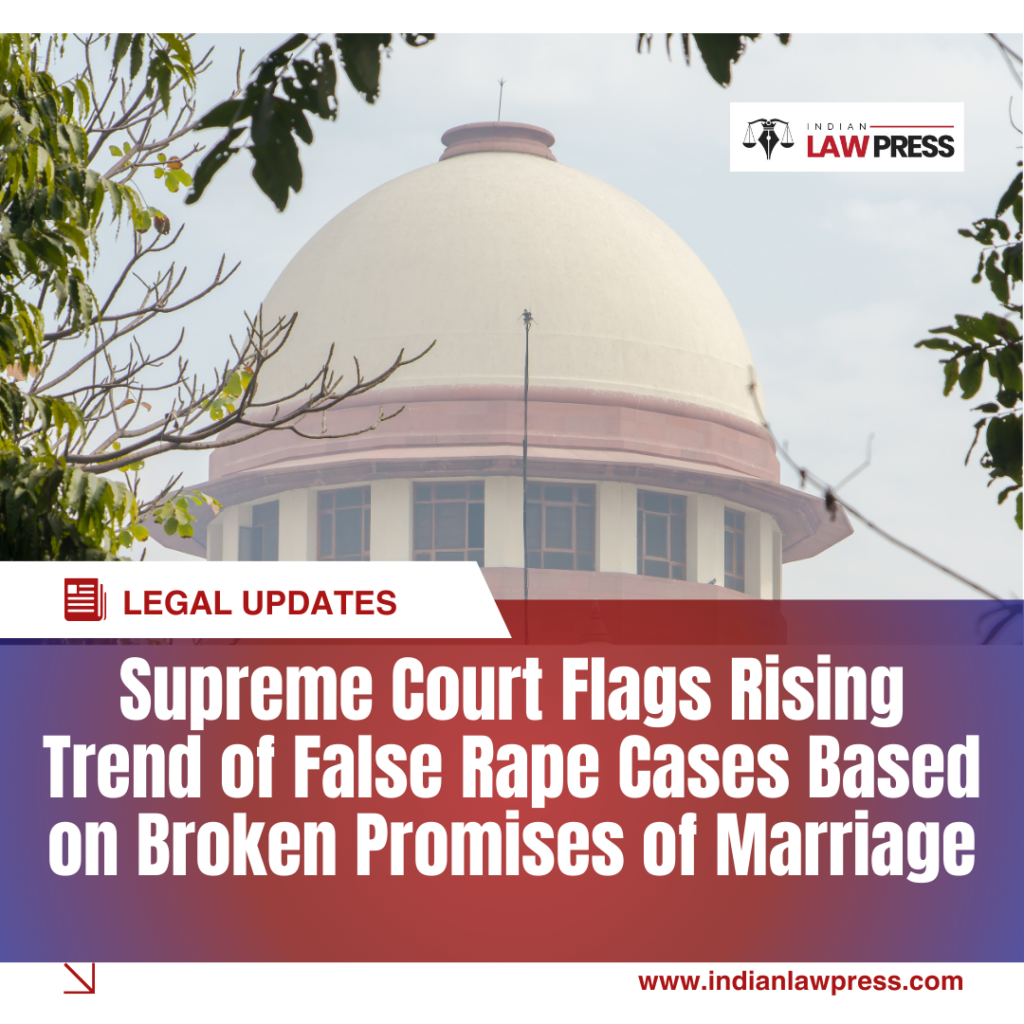Supreme Court rules that judicial officers with seven years’ combined experience as advocates and judges are eligible for direct recruitment as District Judges. Learn key takeaways, eligibility criteria, and impact on judicial appointments.
Supreme Court Clears Path for Judicial Officers to Become District Judges
In a landmark judgment, the Supreme Court of India, through a Constitution Bench, has clarified the eligibility criteria for judicial officers aspiring to be appointed directly as District Judges. The ruling provides much-needed clarity on the longstanding debate over eligibility of in-service judicial officers versus practicing advocates.
The case in focus is Rejanish K.V. vs. K. Deepa [Civil Appeal No. 3947/2020], which arose after a Kerala High Court order challenged the appointment of a judicial officer as a District Judge.
Key Highlights of the Judgment
- Eligibility Criteria:
- A judicial officer with a combined experience of seven years as an advocate and judicial officer can now apply for direct recruitment as a District Judge.
- The eligibility will be assessed as of the date of application, not at the time of appointment.
- Minimum age for in-service candidates applying directly is 35 years.
- Overruling Dheeraj Mor Case:
- The Supreme Court overruled the earlier Dheeraj Mor judgment, which had barred in-service judicial officers from applying for District Judge posts.
- The new judgment applies prospectively, leaving past appointments unaffected.
- Continuous Experience Required:
- Candidates must have continuous seven-year experience as a judicial officer, advocate, or a combination.
- Breaks in service or practice disqualify candidates from eligibility.
- No Separate Quota for Advocates:
- The Court rejected demands for a 25% quota for practicing advocates, emphasizing merit and experience over quotas.
- Level Playing Field:
- Advocates and judicial officers are now placed on an equal footing.
- All experience, whether before, during, or after judicial service, counts toward the seven-year requirement.
Bench and Judgment Details
The Constitution Bench consisted of:
- Chief Justice of India BR Gavai
- Justices MM Sundresh, Aravind Kumar, SC Sharma, K Vinod Chandran
Lead judgment by CJI BR Gavai emphasized:
“…Experience as an advocate before joining judicial service, experience as a judicial officer, and experience as an advocate after leaving service will all be combined to meet the seven-year requirement for eligibility.”
The Court directed State Governments and High Courts to amend rules for in-service candidates within three months in line with this judgment.
Important Takeaways for Aspiring District Judges

- Eligibility Checkpoint: Seven years of combined continuous experience in Bar and judicial service.
- Age Requirement: Minimum 35 years for all applicants.
- Merit-Based Selection: Promotes efficiency by allowing young and meritorious judicial officers to compete with advocates.
- Purposive Interpretation of Article 233: Ensures the selection process secures the best and most suitable candidates.
- No Retrospective Impact: Only future applications are affected; prior appointments remain valid.
Background of the Case
- Appellant: Rejanish K.V., a practicing lawyer with 7 years of experience, later appointed as Munsiff/Magistrate during the District Judge selection process.
- Respondent: K. Deepa, who challenged the appointment citing ineligibility.
- The case highlighted the conflict between judicial service and Bar experience under Article 233(2) of the Constitution.
- The Supreme Court considered arguments by leading advocates on both sides before delivering its decision.
Why This Judgment Matters
This judgment is a major milestone for legal professionals aiming to rise through the judicial hierarchy. It ensures:
- Fair competition between advocates and in-service judicial officers.
- Recognition of diverse legal experience.
- Promotion of talent and efficiency in the judiciary.
For law students, judicial aspirants, and practicing advocates, this judgment offers clarity and direction for career planning in the Indian judiciary.
Supreme Court Says No: Judicial Service Experience Won’t Count as Law Practice





